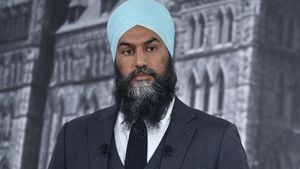A recent court ruling has mandated Jonathan Meijer, known as the mass sperm donor, to cease all public discourse concerning his biological children and their parents. The court's decision, handed down by The Hague, stems from legal actions initiated by several parents who contend Meijer has overstepped the bounds of his agreements with them, including trying to exert influence through his social media presence.
Meijer's infamy as the father of at least 550 children arises largely from the Netflix documentary The Man With 1000 Kids, which portrays him as having fathered as many as 3,000 children. The compelling storytelling of this documentary has drawn significant public interest and scrutiny.
On Tuesday, the judge ordered the 43-year-old donor to remove any videos from his YouTube channel where he addresses the children or makes disparaging comments about their parents. This ruling imposes fines of €10,000 per day, up to €100,000, if he fails to comply. The judge stressed, "Statements in public about these subjects in other ways than via videos are also forbidden," emphasizing the seriousness of the matter.
The core issue revolves around agreements made with parents, which stipulated Meijer would not take on any kind of active role or public persona related to the upbringing of the children. After previous legal battles, including one which prohibited him from making additional donations due to the high risk of incest, the court's decision highlights the delicate balance between freedom of speech and the personal lives of the donor's children.
Meijer has been known for his controversial YouTube content, including remarks aimed at “bully moms,” and providing advice on unconventional topics like consuming raw pig's brains. His online presence has drawn criticism not only from parents of his donor children but broader ethical concerns about donor anonymity and the responsibilities of sperm donors.
According to Lotte van Schuylenburch, the attorney for the parents involved, the ruling is seen as a victory for donors. She expressed gratitude for the court’s swift action, noting, "The judge suggests Meijer has overstepped and there should be consequences for his actions."
Meijer's attorney, Kasper Ripken, noted the ruling was within expectations and suggested there was much room for free speech, asserting, "This is where we hoped to arrive. What is imposed is less than what my client was prepared to accept." Despite the restrictions, Ripken stated Meijer intends to continue vlogging on topics not directed at his biological children.
The decision encapsulates broader discussions about the role of sperm donors and their interactions with offspring. Ethical questions abound concerning the psychological impact on children who discover they have many biological siblings, and how such connections are navigated socially and emotionally.
Meijer's social media presence, heavily populated by advice and comments directed at young men and women, raises eyebrows not only within the immediate community of parents but more broadly related to how donor identities affect family dynamics.
The court's ruling adds significant weight to existing donor agreements which typically enforce strict guidelines on donor conduct, ensuring the privacy and mental well-being of children conceived through sperm donation. These regulations exist, particularly within Dutch law, which enforces rules limiting the number of children per donor to prevent violations of social norms, including potential incestuous relationships.
For the parents involved, the ruling offers some respite from Meijer’s unsolicited outreach, which they claim undermines both the rights of children and their roles as guardians. They have consistently argued for the preservation of their children's mental well-being against Meijer’s publicity-seeking actions.
Reflecting societal tensions around anonymity, ethical accountability, and the nature of donor relationships, this case signifies more than just the personal rights of Meijer, casting shadows on how donor practices align with familial responsibilities. Journalistic inquiry remains necessary, especially as the impact of Meijer's actions reverberates throughout the donor community and beyond.
While Meijer maintains his perspective on parenthood and donations, the court ruling serves as a reminder of the complex interplay between freedom of expression and the privacy rights of vulnerable populations—namely, donor-conceived children.
Numerous stakeholders within the donor community, as well as policymakers, will observe the repercussions of this ruling as the discourse around donations and their consequences continues to evolve.



